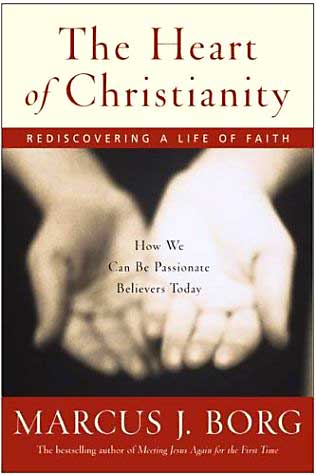Yes.
The short answer is that yes, he is - albeit in a slightly modified way.
I will focus on laying out what, exactly, Rob Bell believes. I will not critique Bell’s re-imagining of hell, others have done so quite eloquently and they are worth reading. Instead I simply desire to show – through the almost constant equivocation – what Rob Bell appears to be saying.
Story Time
Truth is not raised up as a value in the book – instead, discussion and stories are:
Some communities don’t permit open, honest inquiry about the things that matter most. … I believe the discussion itself is divine. … If this book, then, does nothing more than introduce you to the ancient, ongoing discussion surrounding the resurrected Jesus in all its vibrant, diverse, messy, multivoiced complexity – well, I’d be thrilled. (ix)
The important thing is not that we find truth.
It is not that we shed more understanding on
heaven
hell
and the fate of every person who ever lived.
The important thing is that we discuss.
For Rob Bell, discussion itself is an end value. Clarity in doctrine is not nearly as important.
No questions should be out of bounds in church. No doctrine should be unchallenged. Yet discussion should be a means of developing understanding. Taking ownership of the truths that the Bible teaches. Trying to get closer to the heart of God. The goal should be clarity, not confusion.
Beyond just discussion as an ultimate value, for Rob Bell the validity of statements of fact should be judged based on how “good” of a story they are.
It’s important that we be honest about the fact that some stories are better than others. Telling a story in which billions of people spend forever somewhere in the universe trapped in a black hole of endless torment and misery with no way out isn’t a very good story. Telling a story about a God who inflicts unrelenting punishment on people because they didn’t do or say or believe the correct things in a brief window of time called life isn’t a very good story.
In contrast, everybody enjoying God’s good world together with no disgrace or shame, justice being served, and all the wrongs being made right is a better story. It is bigger, more loving, more expansive, more extraordinary, beautiful, and inspiring than any other story about the ultimate course history takes. (110-111)
Now to take a look at the stories that Rob Bell paints about life after this one.
Hell Now: On Earth
Rob Bell makes a point of stating that heaven and hell are both now and in the future. We start practicing now for our lives later on. Bell points to evil around the world and says that “hell” is a good term to describe it:
Have you ever sat with a woman while she talked about what it was like to be raped? How does a person describe what it’s like to hear a five-year-old boy who father has just committed suicide ask: “When is daddy coming home?” How does a person describe that unique look, that ravaged, empty stare you find in the eyes of a cocaine addict? (p. 71)
Life here and now can be quite hellish. At least, that is the word that we use to describe it. And that is enough for Bell. War zones, corporate greed, sexual abuse – that is hell and it is here on earth.
This hell comes about because of our bad choices. In essence, we choose to create our own hell, and sometimes we forcibly drag others into it:
I’ve seen what happens when people abandon all that is good and right and kind and humane. (p. 71)
This hell is very real and inescapable. Nobody is going to disagree on this point. We may not ascribe the theological concept of hell to these hellish situations or agree that this is what Jesus was talking about, but we certainly agree that life on earth that be brutally painful and inhumane.
If Rob Bell believes in hell on earth, can we call him a universalist?
Judgement
For Bell, Judgement Day does come. It is not, however, a time when God judges the the hearts/actions of men. It is when God finally banishes evil and sin from the world – the acts/concepts themselves.
God acts.
Decisively.
On behalf of everybody
who’s ever been stepped on by the machine,
exploited,
abused,
forgotten,
or mistreated.
God puts an end to it.
God says, “Enough.” (38-39)
There is justice for the sins, and mercy for the sinners. Although his definition of justice seems to be “removal of evil.” There is no punishment extracted by God from people who have unrepentantly done evil. The only punishment for them is self-inflicted. It is a result of them living in their own little hells that they have created.
Hell Later: In Heaven
Bell only uses the phrase “Love Wins” three times in his book. The first time, it is while describing classical universalism.
Paul declares in 1 Corinthians 13, “Love never fails.” At the center of the Christian tradition since the first church have been a number who insist that history is not tragic, hell is not forever, and love, in the end, wins and all will be reconciled to God. (p. 109)
Rob Bell’s motto is “Love Wins,” the title of the book is “Love Wins,” and the first of three uses of the phrase in the book is in the definition of traditional universalism. That ought to be a hint to understanding his beliefs.
At his core, Bell agrees with this classical view of universalism, he just disagrees on how we get to the point of universal salvation. It is a disagreement of means, not ends.
Traditionally, God unilaterally forgives and reconciles all people, and there is no hell. In Bell’s view, God unilaterally forgives and reconciles all people – everyone will be in heaven – but it’s up to us to accept that and change our view from “our story” to “God’s story.”
As much as Rob Bell ridicules the traditional understanding that salvation is based on what we believe – his own criterion is based on beliefs. Instead of our belief in Jesus Christ that gets us a ticket to heaven, it is our belief about ourselves that matters.
The central illustration of Bell’s understanding of hell is the parable of the prodigal son. The younger son returns home and his father throws him a party. While at that party, the older son is upset, because he feels like his father has dealt unfairly with him. He father replies “my son, you are always with me, and everything I have is yours.” Was the father a harsh master, or a loving father? According to Bell:
The difference between the two stories is,
after all,
the difference between heaven … and hell.
Jesus puts the older brother right there at the party, but refusing to trust the father’s version of his story. Refusing to join in the celebration.
Hell is being at the party.
That’s what makes it so hellish. (169)
Hell is our refusal to trust God’s retelling of our story. (170)
That is Rob Bell’s understanding of hell. Everyone goes to the party, everyone goes to heaven. The difference is that, while there, some people accept God’s story about their lives and thus enjoy the party, and some people hold on to bitterness, anger, hate, resentment – “their version of the story.”
Fundamentally, Bell believes that just as we have the free choice in this life to reject God’s telling of our story, God’s love, we will have the same opportunity in the next life. Based on the story of Soddom and Gomorrah, Bell believes that we will have opportunities to reject or accept God’s story even after death:
In Matthew 10, [Jesus] warns the people living in the village of Capernaum, “It will be more bearable for Sodom and Gomorrah on the day of judgment than for you.”
More bearable for Sodom and Gomorrah?
He tells highly committed, pious, religious people that it will be better for Sodom and Gomorrah than them on judgment day?
There’s still hope?
And if there’s still hope for Sodom and Gomorrah, what does that say abouut all of the other Sodoms and Gomorrahs? (84-5)
Not only will we all still have the choice to choose or reject God’s love after death, in Bells’ understanding, everyone will eventually choose God’s story. We have already seen that everybody goes to the party (heaven), it is also the case that everyone will finally accept the fact that they are at the party, and start to have fun.
There is a certain logic to this universalism. Simply put, God wants everyone to be saved, and God gets what he wants:
And then there are others who ask, if you get another change after you die, why limit that change to a one-off immediately after death? And so they expand the possibilities, trusting that there will be endless opportunities in an endless amount of time for people to say yes to God.
As long as it takes, in other words.
At the heart of this perspective is the belief that, given enough time, everybody will turn to God and find themselves in the joy and peace of God’s presence. The love of God will melt every hard heart, and even the most “depraved sinners” will eventually give up their resistance and turn to God. (106-7)
In the end, none will stick with their old story. It may take some longer than others, but in the end, love wins, hell is empty, and all are reconciled to God.
Bonus: Jesus Christ
Most people want to know what Rob Bell says about Hell in particular, and the afterlife in general, so I have put those two first. If you have made it this far, and are interested in a little more of Bell’s theology, here is a bonus section on his Christology.
Not surprisingly, Bell also takes the traditional universalist approach to the person of Jesus Christ.
Jesus is everywhere working in everyone and everything. He bases this on Paul’s exposition of the exodus from Egypt:
The apostle Paul refers to this story about this rock, saying that those who traveled out of Egypt “drank from the spiritual rock that accompanied them, and that rock was Christ.” (143)
According to Paul,
Jesus was there.
Without anybody using his name.
Without anybody saying that it was him.
Without anybody acknowledging just what – or, more
precisely, who – it was.
Where else has Christ been present?
When else?
With who else?
How else? (144)
Bell then goes on to answer these questions:
Jesus is supracultural.
He is present within all cultures (151)
[Jesus] doesn’t even state that those coming to the Father through him will even know that they are coming exclusively through him. He simply claims that whatever God is doing in the world to know and redeem and love and restore the world is happening through him. (154)
This [understanding] insists that Jesus is the way, but holds tightly to the assumption that the all-embracing, saving love of this particular Jesus Christ will of course include all sorts of unexpected people from across the cultural spectrum.
As soon as the door is opened to Muslims, Hindus, Buddhists, and Baptists from Cleveland, many Christians become very uneasy, saying that then Jesus doesn’t matter anymore, the cross is irrelevant, it doesn’t matter what you believe, and so forth.
Not true.
Absolutely, unequivocally, unalterably not true.
What Jesus does is declare that he,
and he alone,
is saving everybody.
And then he leaves the door way, way open. Creating all sorts of possibilities. He is as narrow as himself and as wide as the universe.
He is as exclusive as himself and as inclusive as containing every single particle of creation. (155)
Sometimes people bump into Jesus
they trip on the mystery,
they stumble past the word,
they drink from the rock,
without knowing what or who it was.
…
He is the rock, and there is water for the thirsty there,
wherever there is. (158)
Sometimes people use his name;
other times they don’t. (159)
Bell is very clear. The only way to heaven is Jesus, because Jesus is the one fixing the world. But, you do not have to know the name Jesus to reap the benefits. He is everywhere and in everything, doing his saving work.
Caveats
Rob Bell’s theology is very difficult to pin down. He does that on purpose. Remember, truth and clarity are not values – discussion is. The more equivocation from Bell, the more discussion, so really it is just a means to his desired end.
Protestations to the contrary, Bell knows that what he is proposing is outside the mainstream, and he offers up caveats every now and then. After dozens of pages of his beliefs, he will occasionally throw in a sentence of “but maybe I’m wrong.” These are few and far between, and serve no purpose but for Bell to point to when he is called out on charges of heresy.
After giving us an eloquent case for universal salvation, for example, Bell writes:
Will everybody be saved,
or will some perish apart from God forever because of their choices?
Those are questions, or more accurately, those are tensions we are free to leave fully intact. We don’t need to resolve them or answer them because we can’t, and so we simply respect them, creating space for the freedom that love requires. (115)
Bell offers an entire chapter on why penal substitution is wrong and a nasty story. He then adds that it may possibly be true … but that does not matter:
Many have heard the gospel framed in terms of rescue. God has to punish sinners, because God is holy, but Jesus has paid the price for our sin, and so we can have eternal life. However true or untrue that is technically or theologically, what it can do is subtly teach people that Jesus rescues us from God. (182)
Discussion
Like Bell, I also value discussion – but I value it as a means to furthered understanding.
If you have read Love Wins and feel that I have misrepresented his position, please let me know in the comments, I would appreciate hearing your perspective.
If you have not read it, but are confused on certain points that I have brought up in my review, also let me know in the comments. There is much that I left out in the interest of presenting a clear and concise picture of Bell’s understanding of Heaven, Hell, and the Fate of Every Person Who Ever Lived.












